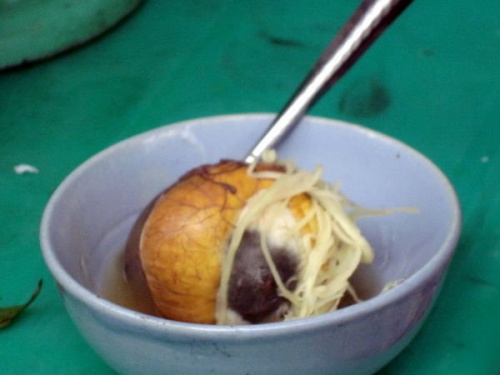So far, I haven’t written much about the Vietnamese cuisine. This has two main reasons. First of all, I cannot cook at all. And as long as I get many delicious things for little money on the market, I am way too lazy to really learn how to cook. The Vietnamese cuisine is among the most time-consuming dishes. When guests for dinner are coming, housewives and daughters spend many hours in the kitchen. For me it’s somehow lost time. In this matter, I am by no means the ideal daughter-in-law for a Vietnamese family. In the Vietkochen blog of my blog friend Bunzel there are plenty of Vietnamese recipes from all categories. I won’t rival her and, therefore, focus on some exotic specialties that you cannot find on the menu in Europe. Today, I want to present you Trung vit lon. That are half-hatched duck eggs. That might sound a bit scary at first, but they’re delicious. The eggs are kept warm in special baskets for about two weeks. On the 9th day the eggs are rayed and those without chicks in it are sorted out. For eating the eggs it’s ideal when the chicks are between 17 and 19 days old. They have to be boiled in the water for about 20 minutes. Here’s the manual how to eat them: First remove a piece of the shell, salt it and then sip the liquid that tastes like a good chicken bouillon. After that, peal the whole egg and flavour it with salt, pepper, basil and grated ginger. You can clearly see the chick’s beak, but it is so soft that you can eat it. The meat is very tender and tastes really excellent. Like many of such exotic things, these eggs are said to have a health-promoting effect. Whether this is true or not, I don’t know. In any case, for most Vietnamese, and now also for me, they are a delicacy. In Germany the sale and consumption of a half-hatched egg is prohibited. In Vietnam and China, however, you can find them almost everywhere. But I also understand anyone who would never eat such a thing. At least when trying it for the first time you need a lot of courage. Best regards Cathrin Cathrin’s Blog: Zwischen Traditionen und Moderne




